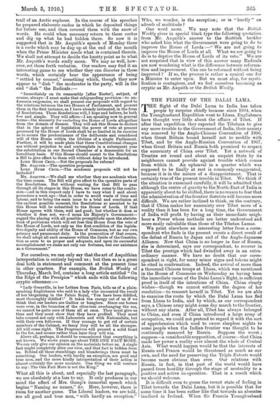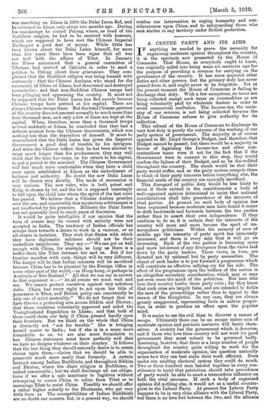THE FLIGHT OF THE DATA T LAMA.
THE flight of the Dalai Lama to India has taken people by surprise chiefly because since 1904, when the Younghusband Expedition went to Lhasa, Englishmen have thought very little about the affairs of Tibet. If after that expedition they expected the Tibetans to give any more trouble to the Government of India, their anxiety was removed by the Anglo-Chinese Convention of 1906, when Great Britain bound herself not to meddle with Tibet, and by the Anglo-Russian Convention of 1907, when Great Britain and Russia both promised to respect the suzerainty of China over Tibet. Yet a network of Treaties set round and about an unquiet State by its neighbours cannot provide against trouble which comes from within it. An upheaval in a quarter which was supposed to be finally at rest is commonly exaggerated, because it is in the nature of a disappointment. That is certainly true of the present trouble in Tibet. We think if the situation is examined carefully, it will be admitted that although the centre of gravity to the North-East of India is apparently about to be shifted, there is no reason to fear that the administration of the frontier districts will become more difficult. We are rather inclined to think, on the contrary, that if China makes her suzerainty over Tibet more of a reality than it has been for a long time, the Government of India will profit by having as their immediate neigh- bour a Power whose methods are better understood and more easily calculable than those of the Tibetan Lamas.
We print elsewhere an interesting letter from a corre- spondent who finds in the present events a direct result of the defeat of Russia by Japan and of the Anglo-Japanese Alliance Now that China is no longer in fear of Russia, she is determined, says our correspondent, to recover in. Tibet the prestige which had dwindled away in an extra- ordinary manner. We have no doubt that our corre- spondent is right, for many minor signs and tokens might be cited in confirmation. Indeed, the arrival of more than a thousand Chinese troops at Lhasa, which was mentioned in the House of Commons on Wednesday as having been the immediate cause of the Dalai Lama's flight, is sufficient proof in itself of the intentions of China. China clearly wishes—though we cannot estimate the degree of her resolution—to reassert herself in Tibet. Yet we are able to examine the route by which the Dalai Lama has fled from Lhasa to India, and by which, as our correspondent says, a Chinese army might some day march to the frontier, without any alarm.. After all, Tibet has always belonged to China, and even if China introduced a large army of occupation, we could not pretend to regard it with the sort of apprehension which used to cause sleepless nights to some people when the Indian frontier was thought to be continually menaced by Russia. Suppose the worst ; suppose—a considerable supposition, of course—that China made her power a reality over almost the whole of Central Asia. What would happen would be that the interests of Russia and France would be threatened as much as our own, and the need for preserving the Triple Entente would become more obvious than ever. Our relations with Russia, in fact, in that part of the world would have passed from hostility through the stage of neutrality to a positive and active co-operation. That is a result which we should welcome.
It is difficult even to guess the recent state of feeling in Tibet towards the Dalai Lama, but it is possible that for some time it has been rather like that towards an absentee landlord ia Ireland. When Sir Francis Younghusband was marching on Lhasa in 1904 the Dalai Lama fled, and be returned to Lhasa only about two months ago. During his wanderings he visited Peking, where, as head of the Buddhist religion, he had to be received with honours, which are supposed to have cost the Chinese Imperial Exchequer a good deal of money. While little has been known about the Dalai Lama himself, for more than five years there have been signs that all was not well with the affairs of Tibet. In January the Times announced that a general committee of Tibetans had arrived at Calcutta in order to send a petition to Peking about their grievances. They com- plained that the Buddhist religion was being treated with contumely ; that the Chinese Ambans, who stand for the suzerainty of China at Lhasa, had desecrated and destroyed monasteries ; and that non-Buddhist Chinese troops had been pillaging and oppressing the country. It must not be supposed that the Dalai Lama, has fled merely because Chinese troops have arrived at his capital. There are always Chinese troops there. But the total Chinese garrison of the country does not amount normally to much more than four thousand men, and only a few of these are kept at the capital. When, therefore, more than a thousand troops arrived suddenly at Lhasa, he concluded that they had a definite mission from the Chinese Government, which was nothing less than the deposition of himself. It must be remembered that the Dalai Lama has given the Imperial Government a good deal of trouble by his intrigues. And when the Chinese reflect that he has been allowed to reign much longer than his predecessors, they may well think that the time has come, on his return to his capital, to put a period to the mischief. The Chinese Government will feel much more comfortable when they have a child once again established at Lhasa as the embodiment of holiness and authority. No doubt the new Dalai Lama will be chosen very shortly. The mode of succession is very curious. The new ruler, who is both priest and King, is chosen by lot, and the lot is supposed unerringly to fall upon the child into whom the spirit of the last ruler has passed. We believe that a, Chinese Amban presides over the urn, and conceivably this mysterious arbitrament is not unaffected by his presence. Hitherto the Dalai Lama has not generally lived to reach years of discretion.
It would be quite intelligible if our opinion that the turn of events may be viewed with serenity were not accepted in India. The tendency of Indian officials has always been towards a desire to work in a vacuum, or at all events in isolation. They wish that States with which they have diplomatic relations should not be their immediate neighbours. They say :—" We can get on well enough with China, for example, so long as there is a buffer-State like Tibet between her and us. But if her frontier marches with ours, things will be very different. The danger will be that Indian interests will be sacrificed because China has to be placated by the Foreign Office in some other part of the world,—in Hong-kong, or perhaps in Australia or New Zealand." All that we can say in answer to that argument is :—" At all events we must wait and see. We cannot protect ourselves against very nebulous risks. China has every right to act upon her title of possession in Tibet, and British policy can consistently be only one of strict neutrality." We do not forget that we have thrown a protecting arm across Sikkim and Bhutan; that those countries voluntarily approved and aided the Younghusband Expedition to Lhasa; and that both of them could claim our help if China pressed hardly upon their frontiers. But we think on the whole that China is distinctly not " out for trouble." She is bringing herself nearer to India ; but if she is in a sense more formidable to us, we are also more formidable to her. Chinese statesmen must know perfectly well that we have no designs whatever on their country. It follows that the last thing they should naturally desire is to create claims upon them,—claims that we should be able to prosecute much more easily than formerly. A certain ferment among Indian Buddhists, and throughout Sikkim and Bhutan, where the State religion is Buddhism, is indeed conceivable ; but we shall discharge all our obliga- tions if we offer a safe sanctuary to fugitives without attempting to coerce China to retire from Tibet or to encourage Tibet to resist China Possibly we should offer a rather higher subsidy to the Bhutanese, who get very little from us. The susceptibilities of Indian Buddhists are no doubt our concern- but. in a general way, we should confine our intervention to urging humanity and con- siderateness upon China, and to safeguarding those who seek shelter in any territory under British protection.















































 Previous page
Previous page